Kakran Clinches 68kg Gold as Indian Women Get off to Strong Start Before Home Crowd
Thursday, February 20, 2020 - 10:36 By Ken Marantz

NEW DELHI (Feb. 20) -- Divya KAKRAN (IND) shed tears of joy after clinching a gold medal for host India, while compatriots advanced to three of the four other finals as women’s wrestling got started Thursday at the Asian Championships.
Kakran won all four of her matches by fall at 68kg, which, with just five entries, is being competed in a round-robin format. With no matches remaining in the night session, she secured her first Asian gold after finishing third in 2019 and second in 2017.
Kakran’s key victory came in the fourth round of matches over reigning world junior champion Naruha MATSUYUKI (JPN), when she was losing 4-4 on criteria but locked up her opponent’s arms from the bottom and tipped her over backwards to secure a fall at 4:20.
“That’s my best move,” Kakran said through tears. “Before coming here, I thought that I wanted to pin everyone.”
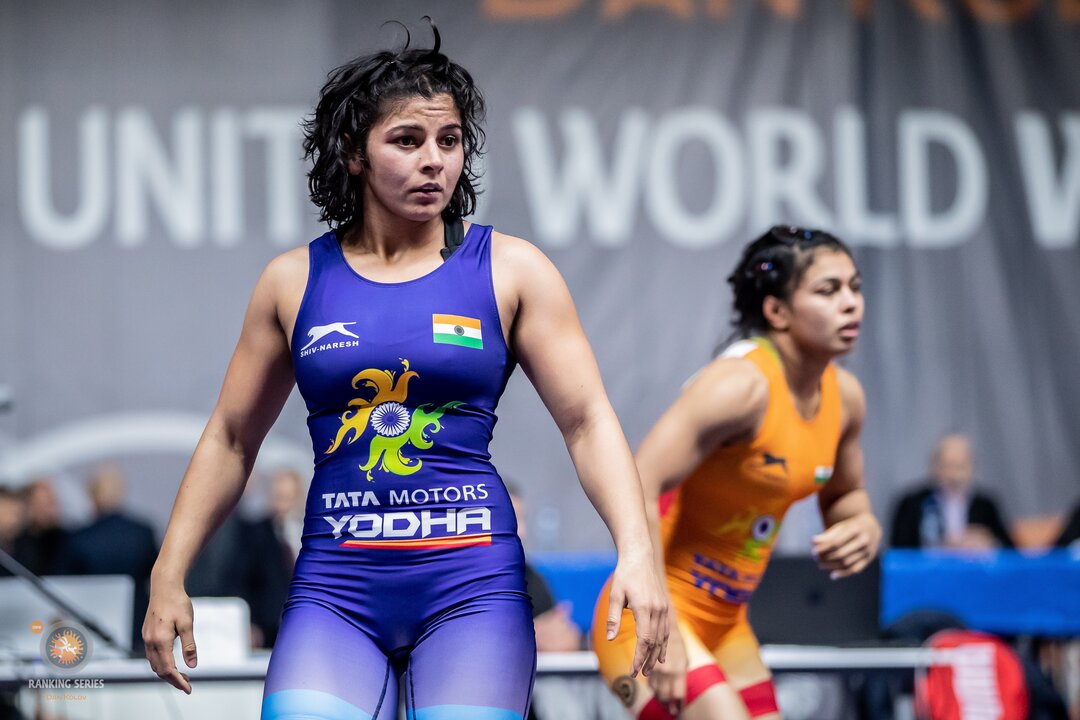 Sarita SARITA (IND) is one of three Indian Day Three finalists. (Photo: Gabor Martin)
Sarita SARITA (IND) is one of three Indian Day Three finalists. (Photo: Gabor Martin)
In the night session, India will have a chance to pick up more golds through Devi NIRMALA (IND) at 50kg, Pinki PINKI (IND) at 55kg and Sarita SARITA (IND) at 59kg. Japan has two finalists, including world 76kg silver medalist Hiroe MINAGAWA (JPN), as does Mongolia, while Kyrgyzstan has one.
India’s American coach Andrew Cook, hired a year ago as a “women’s foreign expert,” said he was proud of the team’s showing in a competition that unfortunately is missing women’s powerhouses China and the Democratic People’s Republic of Korea due to circumstances related to the new coronavirus.
“I think the last two months or so we’ve had some of the best training that I’ve [seen] in the year that I’ve been in India,” Cook said. “Cohesion with coaches, cohesion with athletes. I think the training program is right on point.
“I’m happy with the things they are showing. They’re actually doing what we do in practice. That’s a big deal.”
Cook said his concerns about how his charges would deal with the pressure of competing before the home crowd at K.D. Jadrav Wrestling Stadium were swiftly alleviated.
“I was a little bit worried, because through the weekend, they all split off and went to their homes and I didn’t really see them until this morning,” Cook said. “So I was a tiny bit worried, how we were going to react, how were we going to wrestle. I also felt that they’re very comfortable in India, and they wrestle hard for their fans. I thought it would wash, and it washed strong.”
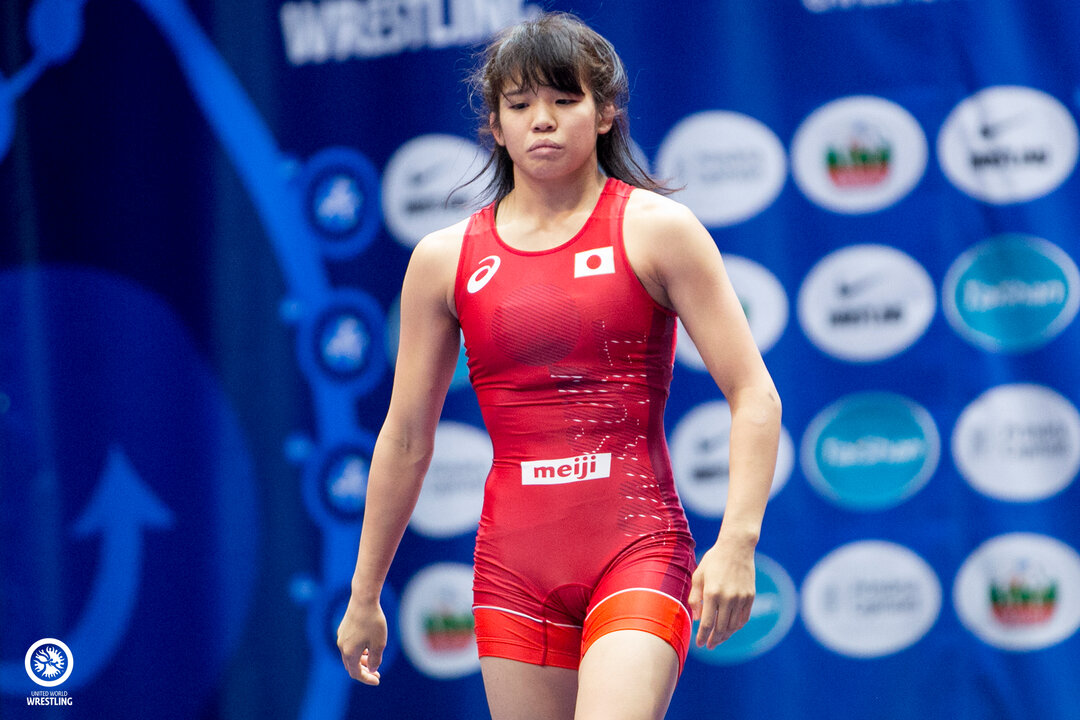 Miho IGARASHI (JPN) upset Valentina ISLAMOVA BRIK (KAZ), a world bronze medalist, and made it to the 50kg finals. (Photo: Gabor Martin)
Miho IGARASHI (JPN) upset Valentina ISLAMOVA BRIK (KAZ), a world bronze medalist, and made it to the 50kg finals. (Photo: Gabor Martin)
In the 50kg final, Nirmala will face two-time world U-23 champion Miho IGARASHI (JPN), who pulled off an upset when she scored the decisive takedown with :15 left in a 5-3 victory over world bronze medalist Valentina ISLAMOVA BRIK (KAZ).
“I lost to her two years ago, and I was going for revenge,” Igarashi said. “Even though I cut it close, I thought if I stayed calm, I could turn her over. I kept my cool during the match and it paid off.”
Igarashi has extra motivation coming into her first senior continental championships—younger sister Saki already has an Asian gold, which she won at 55kg in 2018 in Bishkek.
“My younger sister won the title before me, so I want to catch up and definitely win the championship,” she said with a smile.
Nirmala earned her place in the final by rolling to a 10-0 technical fall over Dauletbike YAKHSHIMURATOVA (UZB).
At 55kg, Pinki PINKI (IND) defeated Marina ZUYEVA (KAZ) 6-0 in the semifinals to set up a showdown for the gold with Dulguun BOLORMAA (MGL), who assured she will improve on her 2019 bronze medal by pinning Kana Higashikawa (JPN) in 44 seconds.
Battsetseng ALTANTSETSEG (MGL), a silver medalist a year ago in Xi’an, China, advanced to the 59kg final against Sarita with a 5-1 victory over Madina BAKBERGENOVA (KAZ).
Sarita herself survived a scare against Yuumi KON (JPN), as she scored a 4-point move to go up 10-0, but because the action continued the technical fall was not called. Kon managed to reverse and put Sarita on her back, but she held out to clinch a 10-3 win.
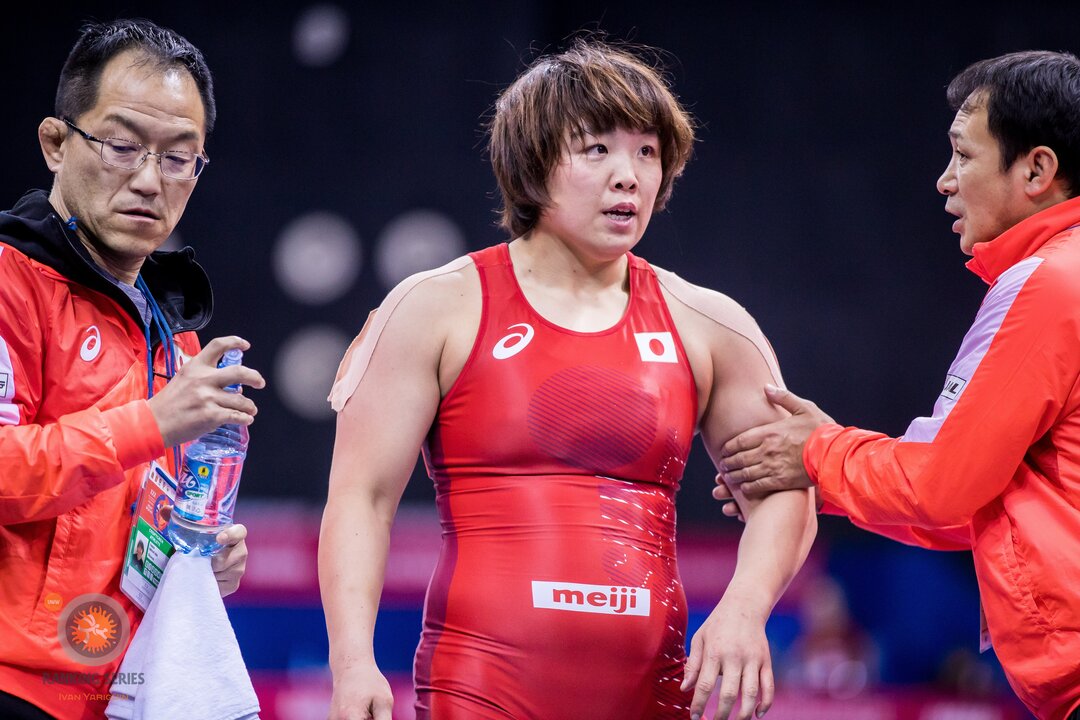 Hiroe MINAGAWA (JPN), the reigning world silver medalist, will wrestle in the 76kg finals. (Photo: Sachiko Hotaka)
Hiroe MINAGAWA (JPN), the reigning world silver medalist, will wrestle in the 76kg finals. (Photo: Sachiko Hotaka)
All but one of the weight classes used preliminary groups due to limited entries, and the 76kg final will be a rematch of Minagawa’s 3-0 victory over world U-23 bronze medalist Aiperi MEDET KYZY (KGZ).
Both wrestlers won their semifinals by fall, with Minagawa topping Arlunjargal GANBAT (MGL) and Medet Kyzy decking Elmira SYZDYKOVA (KAZ), a 2018 bronze medalist who placed fifth at last year’s World Championships.
Minagawa, who scored all of her points against Medet Kyzy on stepouts, is aiming for her third Asian title and first since 2015, and sixth medal overall. She was second to Chinese opponents in both 2018 and 2019.
Meanwhile, the fifth-round match at 68kg between Matsuyuki and Delgermaa ENKHSAIKHAN (MGL) will ostensibly decide the silver and bronze medals.
Results
Women’s Wrestling
50kg (8 entries)
SEMIFINAL – Miho IGARASHI (JPN) df. Valentina ISLAMOVA BRIK (KAZ), 5-3
SEMIFINAL - Devi NIRMALA (IND) df. Dauletbike YAKHSHIMURATOVA (UZB) by TF, 10-0, 3:29
55kg (6 entries)
SEMIFINAL – Pinki PINKI (IND) df. Marina ZUYEVA (KAZ), 6-0
SEMIFINAL – Dulguun BOLORMAA (MGL) df. Kana Higashikawa (JPN) by Fall, :44 (2-0)
59kg (7 entries)
SEMIFINAL – Battsetseng ALTANTSETSEG (MGL) df. Madina BAKBERGENOVA (KAZ), 5-1
SEMIFINAL – Sarita SARITA (IND) df. Yuumi KON (JPN), 10-3
68kg (5 entries)
Round-Robin Standings (through 4 rounds)
1. Divya KAKRAN (IND), 4-0;
2. Naruha MATSUYUKI (JPN), 2-1;
3. Delgermaa ENKHSAIKHAN (MGL) 2-1;
4. Albina KAIRGELDINOVA (KAZ), 0-3;
5. Azoda ESBERGENOVA (UZB), 0-3.
76kg (7 entries)
SEMIFINAL – Aiperi MEDET KYZY (KGZ) df. Elmira SYZDYKOVA (KAZ) by Fall, 2:48 (4-1)
SEMIFINAL – Hiroe MINAGAWA (JPN) df. Arlunjargal GANBAT (MGL) by Fall, 1:33 (5-0)

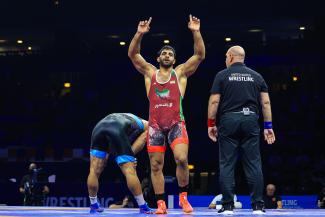
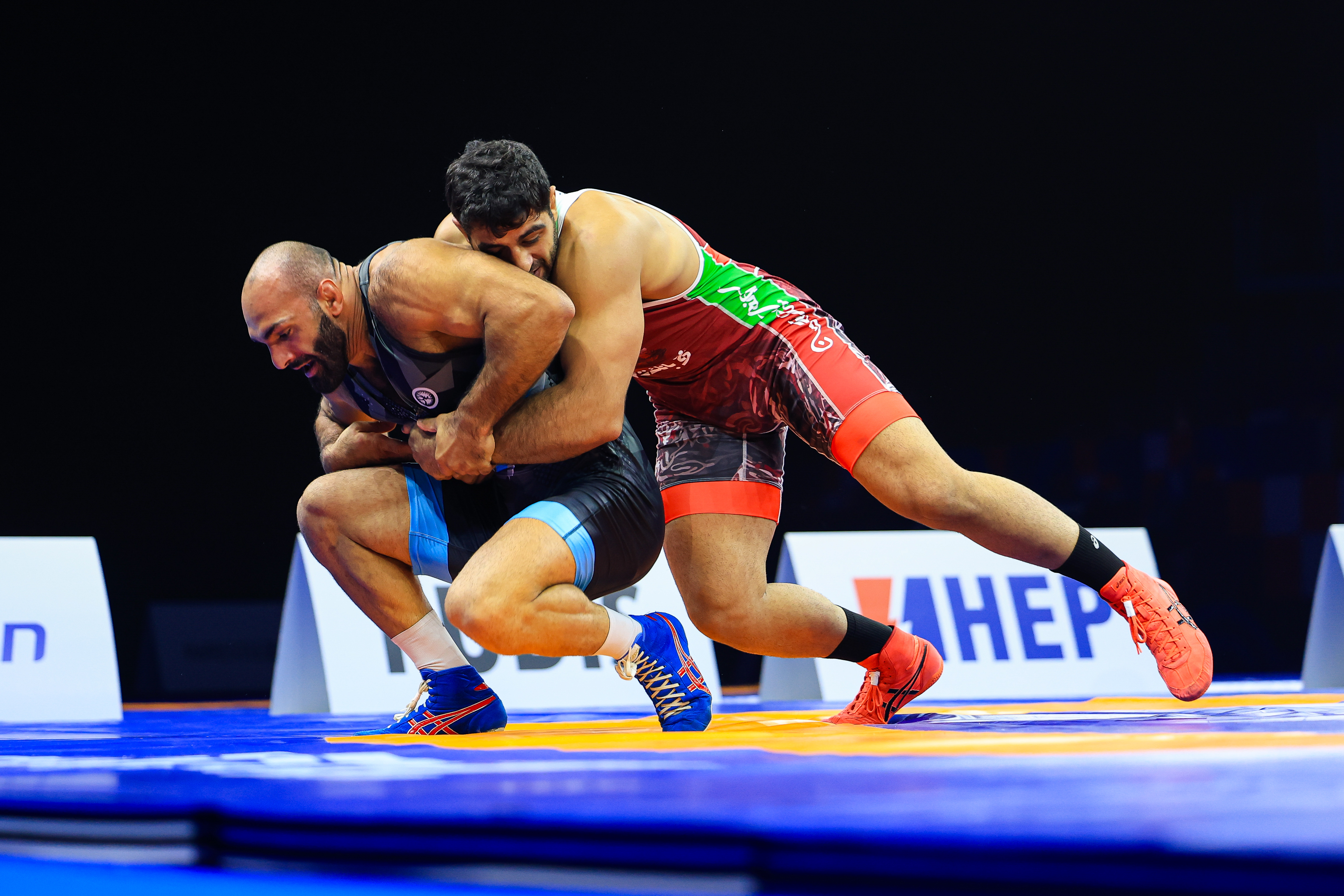 Mohammadhadi SARAVI (IRI) scores a takedown on Artur SARGASIAN (UWW) in the 97kg final. (Photo: United World Wrestling / Kadir Caliskan)
Mohammadhadi SARAVI (IRI) scores a takedown on Artur SARGASIAN (UWW) in the 97kg final. (Photo: United World Wrestling / Kadir Caliskan)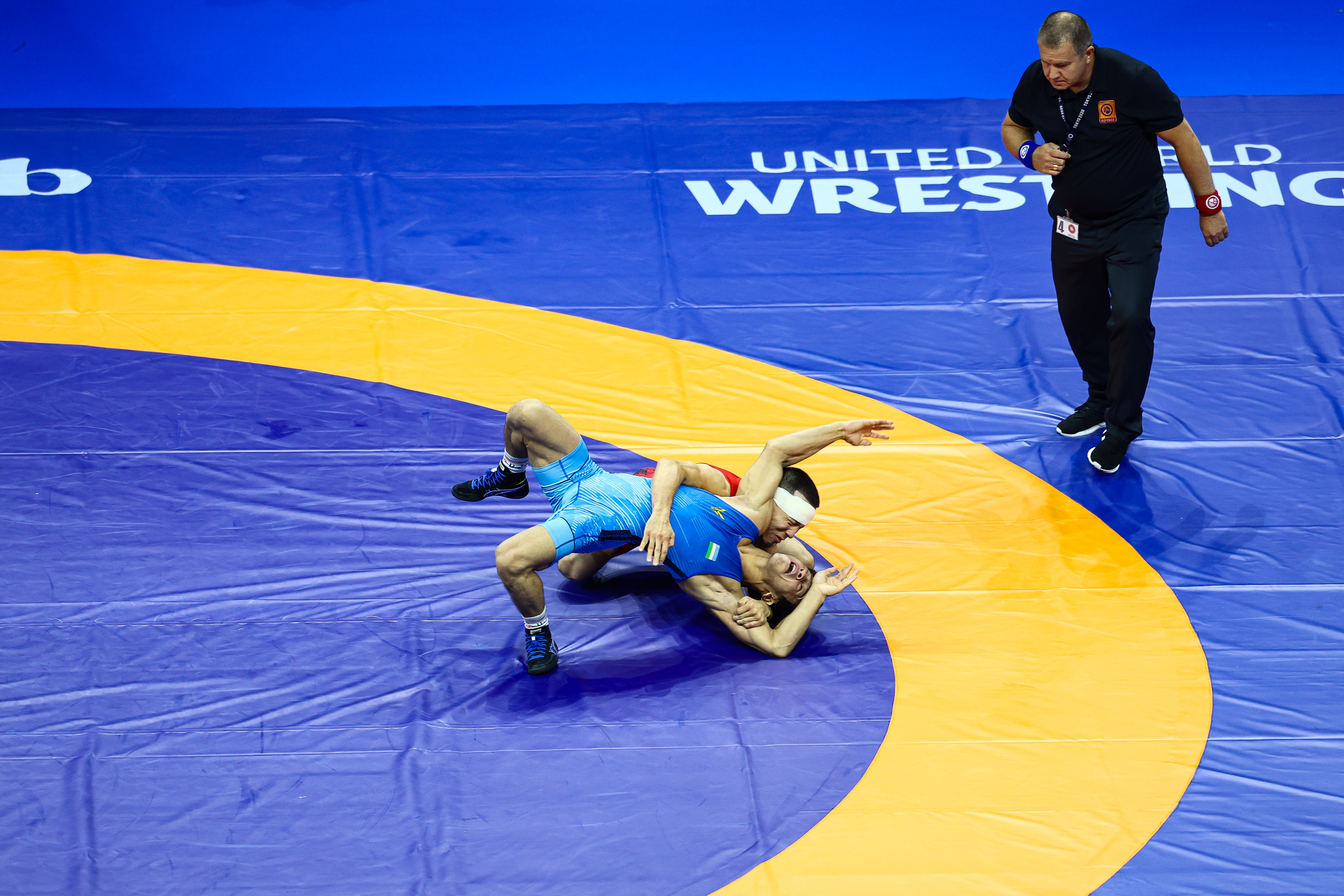 Aidos SULTANGALI (KAZ) scores a four-pointer on Alisher GANIEV (UZB) in the 60kg final. (Photo: United World Wrestling / Jake Kirkman)
Aidos SULTANGALI (KAZ) scores a four-pointer on Alisher GANIEV (UZB) in the 60kg final. (Photo: United World Wrestling / Jake Kirkman)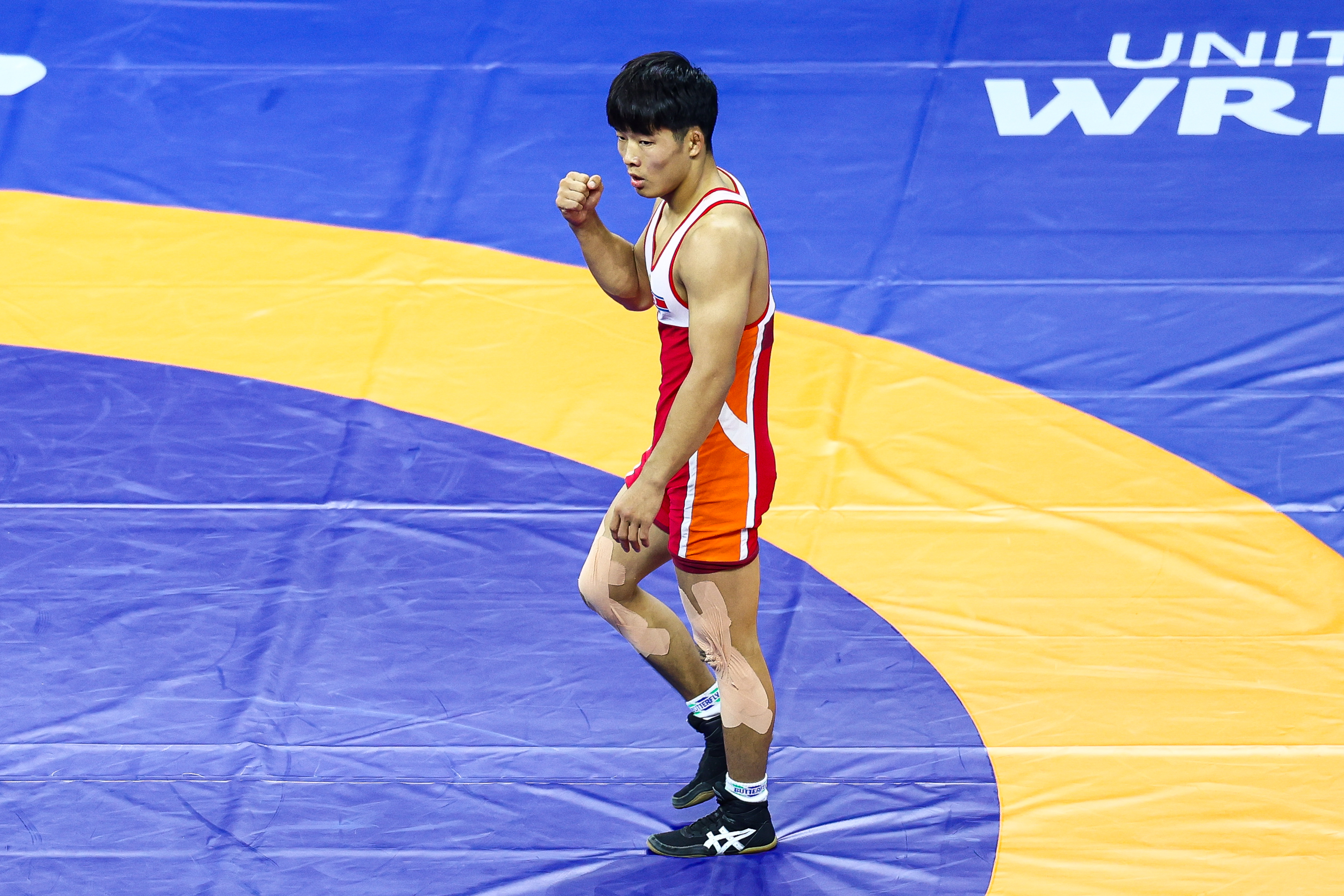 Se Ung RI (PRK) won a bronze medal at the 60kg weight class. (Photo: United World Wrestling / Jake Kirkman)
Se Ung RI (PRK) won a bronze medal at the 60kg weight class. (Photo: United World Wrestling / Jake Kirkman)
Share your thoughts.
Comments